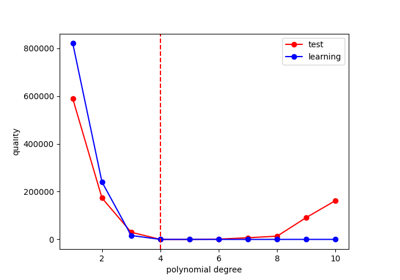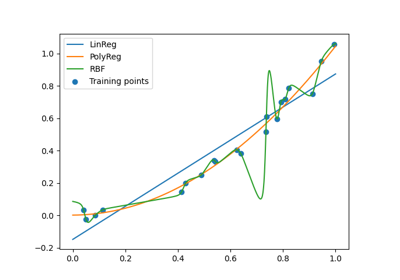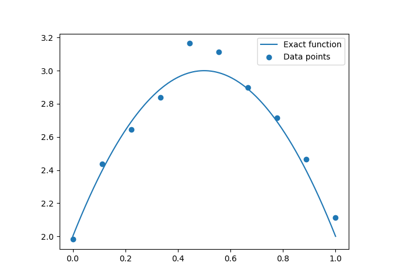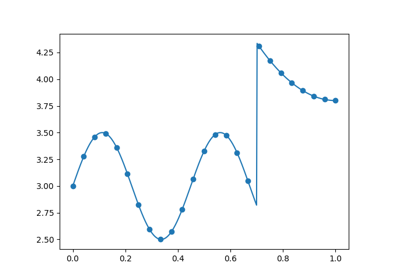error_measure module¶
Here is the baseclass to measure the error of machine learning algorithms.
The concept of error measure is implemented with the MLErrorMeasure class and
proposes different evaluation methods.
- class gemseo.mlearning.quality_measures.error_measure.MLErrorMeasure(algo, fit_transformers=True)[source]
Bases:
MLQualityMeasureAn abstract error measure for machine learning.
- Parameters:
algo (MLSupervisedAlgo) – A machine learning algorithm for supervised learning.
fit_transformers (bool) –
Whether to re-fit the transformers when using resampling techniques. If
False, use the transformers of the algorithm fitted from the whole learning dataset.By default it is set to True.
- evaluate_bootstrap(n_replicates=100, samples=None, multioutput=True, seed=None, as_dict=False)[source]
Evaluate the quality measure using the bootstrap technique.
- Parameters:
n_replicates (int) –
The number of bootstrap replicates.
By default it is set to 100.
samples (Sequence[int] | None) – The indices of the learning samples. If
None, use the whole learning dataset.multioutput (bool) –
If
True, return the quality measure for each output component. Otherwise, average these measures.By default it is set to True.
seed (None | None) – The seed of the pseudo-random number generator. If
None, then an unpredictable generator will be used.as_dict (bool) –
Whether to express the measure as a dictionary whose keys are the output names.
By default it is set to False.
- Returns:
The value of the quality measure.
- Return type:
MeasureType
- evaluate_kfolds(n_folds=5, samples=None, multioutput=True, randomize=True, seed=None, as_dict=False)[source]
Evaluate the quality measure using the k-folds technique.
- Parameters:
n_folds (int) –
The number of folds.
By default it is set to 5.
samples (Sequence[int] | None) – The indices of the learning samples. If
None, use the whole learning dataset.multioutput (bool) –
If
True, return the quality measure for each output component. Otherwise, average these measures.By default it is set to True.
randomize (bool) –
Whether to shuffle the samples before dividing them in folds.
By default it is set to True.
seed (int | None) – The seed of the pseudo-random number generator. If
None, then an unpredictable generator will be used.as_dict (bool) –
Whether to express the measure as a dictionary whose keys are the output names.
By default it is set to False.
- Returns:
The value of the quality measure.
- Return type:
MeasureType
- evaluate_learn(samples=None, multioutput=True, as_dict=False)[source]
Evaluate the quality measure from the learning dataset.
- Parameters:
samples (Sequence[int] | None) – The indices of the learning samples. If
None, use the whole learning dataset.multioutput (bool) –
If
True, return the quality measure for each output component. Otherwise, average these measures.By default it is set to True.
as_dict (bool) –
Whether to express the measure as a dictionary whose keys are the output names.
By default it is set to False.
- Returns:
The value of the quality measure.
- Return type:
MeasureType
- evaluate_loo(samples=None, multioutput=True, as_dict=False)[source]
Evaluate the quality measure using the leave-one-out technique.
- Parameters:
samples (Sequence[int] | None) – The indices of the learning samples. If
None, use the whole learning dataset.multioutput (bool) –
If
True, return the quality measure for each output component. Otherwise, average these measures.By default it is set to True.
as_dict (bool) –
Whether to express the measure as a dictionary whose keys are the output names.
By default it is set to False.
- Returns:
The value of the quality measure.
- Return type:
MeasureType
- evaluate_test(test_data, samples=None, multioutput=True, as_dict=False)[source]
Evaluate the quality measure using a test dataset.
- Parameters:
test_data (IODataset) – The test dataset.
samples (Sequence[int] | None) – The indices of the learning samples. If
None, use the whole learning dataset.multioutput (bool) –
If
True, return the quality measure for each output component. Otherwise, average these measures.By default it is set to True.
as_dict (bool) –
Whether to express the measure as a dictionary whose keys are the output names.
By default it is set to False.
- Returns:
The value of the quality measure.
- Return type:
MeasureType
- algo: MLAlgo
The machine learning algorithm usually trained.





